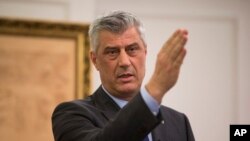Kosovo is ready for a compromise deal with Serbia to resolve long-standing issues between the countries, President Hashim Thaci said in a letter to U.S. President Donald Trump.
Serbia and its former province of Kosovo, which declared independence in 2008, committed in 2013 to a European Union-sponsored dialogue aimed at resolving the situation but little progress has been made.
The talks have been halted since November when the government in Pristina raised customs tariffs on imports of locally-made products from Serbia by 100 percent. Serbia said it would not hold talks if the trade situation was not returned to normal.
"I will be ready and willing to make compromises necessary to reach a comprehensive and balanced settlement that will encompass all outstanding issues, thereby ending the century-old conflict with Serbia, and bringing peace to the whole region," Thaci said in his letter dated January 8.
It remains unclear why Thaci published the letter now, days after he received a letter from Trump urging his Kosovo counterpart to do everything to reach a deal with Serbia two decades after the war ended.
Thaci said in June he would seek a solution with Serbia by "correcting borders," but politicians and analysts in Kosovo said that would mean land swaps.
His plan rang alarm bells among Balkan neighbors and Western governments who saw it as a move to take three Serbian municipalities inhabited mainly by ethnic Albanians, who make up more than 90 percent of Kosovo's population.
If there was a land swap Serbia would get part of northern Kosovo populated mainly by minority Serbs who refuse to recognize the authority of the Pristina government.
Kosovo Prime Minister Ramush Haradinaj has said he is not willing to change his government's decision on tariffs. Washington remains the biggest supporter of Kosovo politically and financially.
It was under U.S. command that NATO bombed Serbian forces in 1999 to halt killings and the expulsion of Kosovo Albanians during a counter-insurgency operation.
Kosovo is recognized by around 110 nations, but not by Serbia, Russia and five EU member states.









